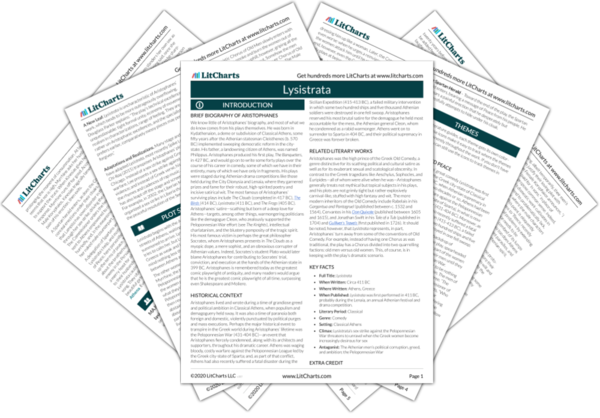War and Peace
Aristophanes’ great comedy Lysistrata was first performed in the Greek city-state of Classical Athens in 411 BC, when Athenian supremacy in Greece was collapsing. For two decades or so, Athens had been engaged in bloody, costly warfare against the Peloponnesian League (led by the Greek city-state of Sparta), in what is now known as the Peloponnesian War (431-404 BC). Moreover, as part of that conflict, Athens had also recently suffered a fatal disaster during the…
read analysis of War and PeaceGender Roles
Though Athens was a democracy, male citizens held all of the political power, and women enjoyed relatively few rights and privileges. Athenian women could not hold political office, for example, or participate in democratic elections, votes, or debates, nor could they serve on juries or bring lawsuits. Furthermore, the economic activity of Athenian women was also limited (although they did budget the household accounts, as Lysistrata says), and so was their freedom of movement. Their…
read analysis of Gender RolesSexuality and the Battle of the Sexes
While Athens wages war against enemies offstage, Lysistrata presents warfare onstage, too: the battle of the sexes. In a parody of warfare, the women of Greece besiege their men with abstinence, and they storm the Acropolis and lock it down as if with a chastity belt. They fight not to the death, but to the peace, and they fight not with swords and bows and spears, but with pitchers of water, spindles, lamps, and other…
read analysis of Sexuality and the Battle of the Sexes
Rebellion, Patriotism, and the Political Power of Comedy
Lysistrata, during the exposition of her comedy, announces that she intends to put into motion a plot “that really deserves the name of monstrous,” a full-blown rebellion. And that is exactly what she does, rebelling both against patriarchal authority and against the disastrous policies of Athens itself. In addition to being the stage for the battle of the sexes, then, the Acropolis is also a symbol for the mind of the Athenian body politic…
read analysis of Rebellion, Patriotism, and the Political Power of Comedy






